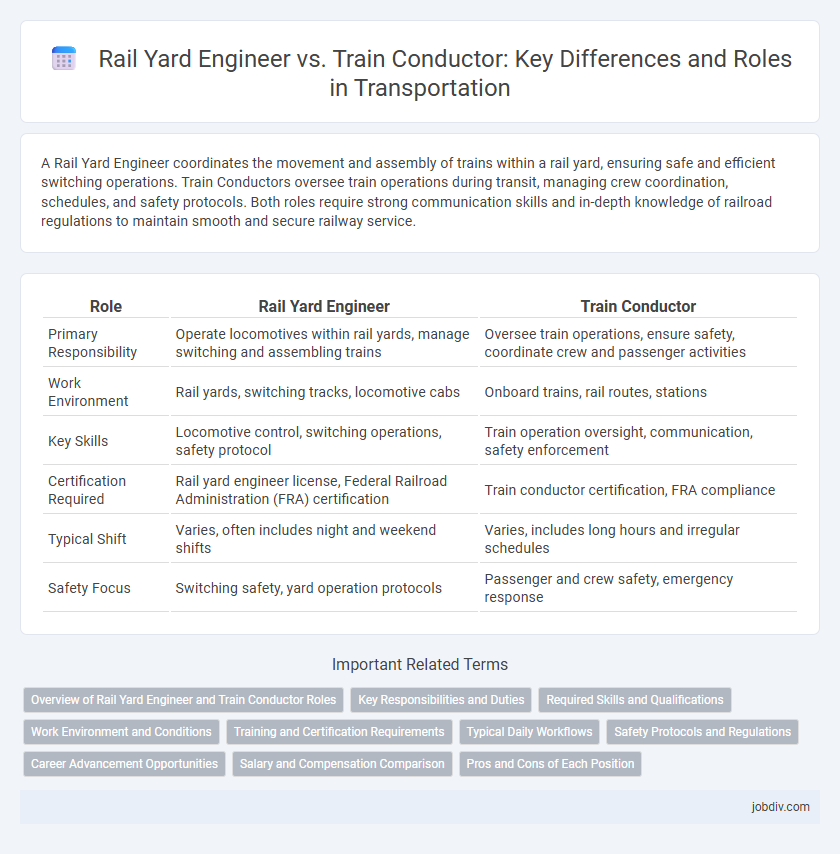A Rail Yard Engineer coordinates the movement and assembly of trains within a rail yard, ensuring safe and efficient switching operations. Train Conductors oversee train operations during transit, managing crew coordination, schedules, and safety protocols. Both roles require strong communication skills and in-depth knowledge of railroad regulations to maintain smooth and secure railway service.
Table of Comparison
| Role | Rail Yard Engineer | Train Conductor |
|---|---|---|
| Primary Responsibility | Operate locomotives within rail yards, manage switching and assembling trains | Oversee train operations, ensure safety, coordinate crew and passenger activities |
| Work Environment | Rail yards, switching tracks, locomotive cabs | Onboard trains, rail routes, stations |
| Key Skills | Locomotive control, switching operations, safety protocol | Train operation oversight, communication, safety enforcement |
| Certification Required | Rail yard engineer license, Federal Railroad Administration (FRA) certification | Train conductor certification, FRA compliance |
| Typical Shift | Varies, often includes night and weekend shifts | Varies, includes long hours and irregular schedules |
| Safety Focus | Switching safety, yard operation protocols | Passenger and crew safety, emergency response |
Overview of Rail Yard Engineer and Train Conductor Roles
Rail Yard Engineers manage the movement and placement of railcars within the yard, ensuring efficient switching operations and safe handling of freight. Train Conductors oversee the operation of trains during transit, coordinating crew activities, managing schedules, and ensuring compliance with safety regulations. Both roles require deep knowledge of railroad operations but focus on distinct areas: rail yard logistics versus train movement and overall journey management.
Key Responsibilities and Duties
Rail Yard Engineers primarily manage locomotive movements within rail yards, ensuring safe coupling, decoupling, and coordination of switches to optimize yard operations. Train Conductors oversee the entire train's operation on routes, managing onboard safety protocols, crew coordination, and cargo documentation. Both roles are crucial for efficient rail transport but differ in focus: yard logistics versus route management.
Required Skills and Qualifications
Rail yard engineers require strong technical skills in operating and maintaining locomotives, in-depth knowledge of rail yard operations, and certifications such as a Locomotive Engineer Certification. Train conductors must possess excellent communication skills, expertise in safety regulations, and qualifications including certification from the Federal Railroad Administration (FRA) to oversee train crew activities and ensure compliance. Both roles demand proficiency in railway signaling systems, attention to detail, and the ability to manage emergency situations effectively.
Work Environment and Conditions
Rail Yard Engineers operate primarily within rail yards, handling switching locomotives and organizing railcars, often exposed to outdoor weather conditions and varying noise levels. Train Conductors work both on moving trains and in stations, managing train operations and passenger safety, facing fluctuating schedules and exposure to diverse climates. Both roles demand physical stamina and adherence to strict safety protocols in dynamic, sometimes harsh environments.
Training and Certification Requirements
Rail Yard Engineers require specialized training in locomotive operations, switching procedures, and safety protocols, often obtained through accredited rail industry programs and on-the-job experience. Train Conductors must complete certification mandated by the Federal Railroad Administration (FRA), which includes knowledge of train handling, signals, emergency procedures, and federal safety regulations. Both roles demand rigorous physical and written testing to ensure adherence to industry standards and secure operational safety.
Typical Daily Workflows
Rail Yard Engineers coordinate the movement and assembly of railcars within rail yards, focusing on switching tracks and ensuring proper alignment for efficient train composition. Train Conductors oversee the entire train operation during transit, managing schedules, safety protocols, and communication with dispatchers. Both roles require precise coordination but differ in location and operational scope, with engineers grounded in yard logistics and conductors managing train movement on rail lines.
Safety Protocols and Regulations
Rail yard engineers adhere strictly to safety protocols involving the maintenance and operation of locomotives within the yard, ensuring compliance with Federal Railroad Administration (FRA) regulations to prevent accidents. Train conductors focus on supervising train crews and coordinating the safe movement of trains, enforcing operational standards and communication procedures critical for passenger and cargo safety. Both roles require rigorous knowledge of safety regulations but apply them at different stages of rail operations to minimize risks and maintain regulatory compliance.
Career Advancement Opportunities
Rail Yard Engineers often have greater opportunities for career advancement through specialized technical roles and supervisory positions within rail operations management. Train Conductors can progress by gaining certifications that lead to roles in train dispatching, logistics coordination, or becoming locomotive engineers. Both career paths benefit from gaining safety training and leadership experience, which are crucial for higher-level positions in the transportation industry.
Salary and Compensation Comparison
Rail Yard Engineers typically earn a salary ranging from $60,000 to $85,000 annually, reflecting their responsibilities in coordinating train assembly and ensuring operational efficiency within rail yards. Train Conductors generally have a broader range of $55,000 to $90,000 per year, with variations influenced by experience, route complexity, and seniority. Both roles may receive additional compensation through overtime, bonuses, and union benefits, though Train Conductors often have higher earning potential due to variable schedules and extended travel assignments.
Pros and Cons of Each Position
Rail Yard Engineers specialize in coordinating railcar movements within the yard, ensuring safe and efficient switching operations, but may face physical demands and irregular hours. Train Conductors oversee the entire train's operation, managing schedules, crew, and safety compliance, though their role involves high responsibility and potential for extended travel away from home. Both positions require precise coordination and communication, with Engineers focusing on yard logistics and Conductors on train operation and passenger or cargo management.
Rail Yard Engineer vs Train Conductor Infographic

 jobdiv.com
jobdiv.com